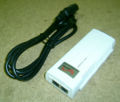Keyless Entry: Difference between revisions
| Line 51: | Line 51: | ||
'''Locked''': Only registered smart card holders can enter the building, but anyone can exit the building by pulling the paddle handle. | '''Locked''': Only registered smart card holders can enter the building, but anyone can exit the building by pulling the paddle handle. | ||
'''Unlocked''': Anyone one can | '''Unlocked''': Anyone one can enter and exit the building. | ||
=== Goal === | === Goal === | ||
Latest revision as of 22:57, 5 January 2008
Keyless entry is when someone doesn't need a traditional key to open a door, instead the key is replaced with a number pad and/or electronic sensor and some kind of RFID tag.
The "Key" Problem
At the Salt Lake City Bicycle Collective we had a proliferation of keys to our shop, mostly legitimate, some not. This was mainly the result of not having a solidified volunteer structure and a laxed key policy for who had access to the shop. The issue was that every time a volunteer would copy, lose, move, or go MIA -- there would be an unaccounted master key to our shop floating around.
Possible Solutions
Re-key the Door
To re-key the door and provide copies to all the legitimate people on the key list would cost around $100 and $3 per key. We could do this, but then we didn't want to do it again.
Re-key the Door with a Special Key
Most Locksmith shops have a proprietary system that in theory only they can make copies of. They keep a list of authorized people from your organization, so when someone comes to make a copy, they have to present photo ID before they get a copy. This was around $200 and $7 per key. However we still would have to deal with the lost key problem.
Number Pad Keyless Entry
We considered using a number pad, but in today's world of fast cell phone texting that didn't seem like a good idea at all.
Smart Key (RFID) Entry
This uses a card reader that smart cards (passive RFID) that look like thick credit cards and/or keychains are waved by. The downside is that it is by far the most technical, expensive and complex of all the solutions. On average outfitting a single door was around $2,500 -- luckily we were able to get almost everything donated.
- A log is kept which holds people accountable for using the shop off hours.
- RFID cards are granted and denied access, so if someone loses a card -- we just disable that card.
- We have the ability to grant limited access -- so someone can only open the door for an hour on a given day.
- Web based control.
Howto Install Keyless Entry
Parts
- Parts for installing a smart card system.
HES 5000 Series Strike (Installation Instructions) - this is the mechanism that releases the door latch.
HID ProxPoint Plus 6005 (Installation Guide) - this is the smart card reader. Which uses HID Proximity - 125 kHz Credentials for access cards.
PowerDsine 1-Port Power over Ethernet Midspan 3001 (User Guide) - this uses the ethernet cable to send power to the the control module.
Integral Intelli-M - this is the "brains" that control who has access which includes the eIDC Control Module (Model #S-EIDC), Power Connector (Model #S-PCON), Supervisor Plus software (Model #S-IMS-E)
Installation Tips
- Since we are using the PowerDSine, we don't need to use the external power supply to the PCON.
- The system is 12v, so the HES 5000 Series Strike does not need to be rewired (page 5).
Software
Definitions
Locked: Only registered smart card holders can enter the building, but anyone can exit the building by pulling the paddle handle.
Unlocked: Anyone one can enter and exit the building.
Goal
At the Salt Lake City Bicycle Collective our shop has Open Shop Nights on Monday, Tuesday and Thursday from 5-9pm. So we wanted to schedule the door to be unlocked from 5-9pm on those days and remain locked the rest of the time. However, in the event a volunteer was late, we didn't want the door to unlock itself with no one we knew around, so ideally it would stay locked until a volunteer is in first and then automatically lock it down again when the shop closes at 9pm.
Intelli-M Supervisor Plus or Web Interface
The Intelli-M can be accessed using an Internet Browser (Firefox, Internet Explorer, etc.,...) or by using an PC application called Intelli-M Supervisor Plus. At present time these two methods don't work together, so you have to pick one. As we found out the PC application has more features.
Generally speaking, our ideal access policy was accomplished using the Intelli-M Supervisor Plus (not the web interface) by applying a Schedule to the Access Service Programming where volunteers are listed under the First In tab.




